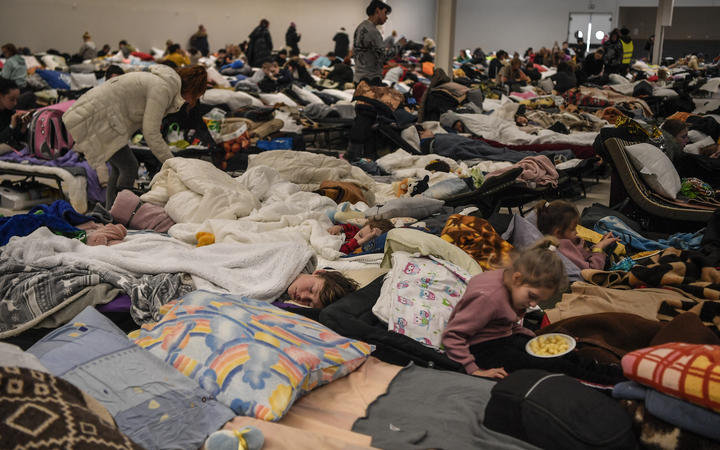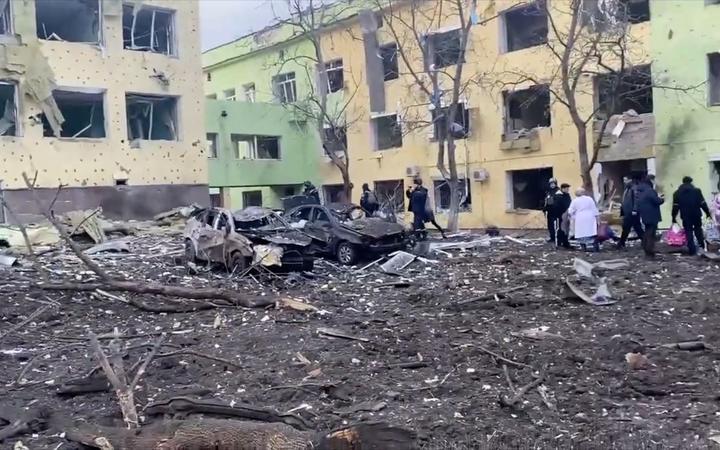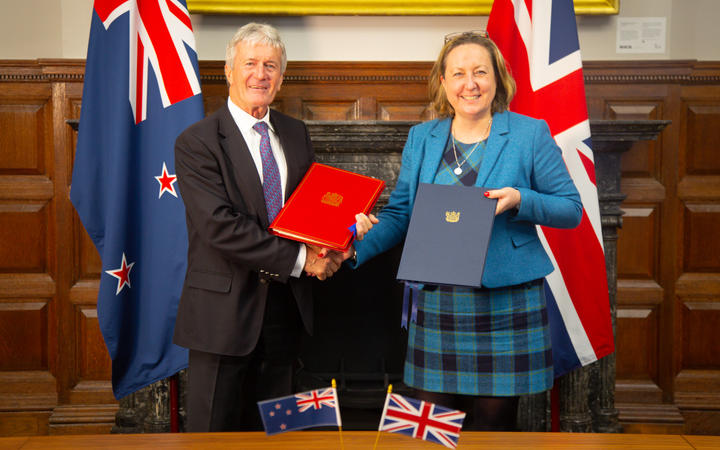Prime Minister Jacinda Ardern's announcement of military support for Ukraine is highly symbolic.
The support package includes a donation of $5 million to NATO's trust fund - to spend on supplies such as fuel and food for soldiers - as well as 1066 body armour plates, 473 helmets and 571 camouflage vests.

There is an understandable desire to deliver some form of tangible, material assistance to Ukrainian troops on the front lines.
The new package is also a measure of the pressure New Zealand is feeling from Western partners that have been eager to offer support to Kyiv and Ukrainian President Volodymyr Zelensky.
New Zealand's total financial contribution so far - including $6m of previously-announced humanitarian aid, but not including the value of the surplus military equipment - now totals $11m.
New Zealand is not supplying weapons to Ukraine - but Jacinda Ardern has not entirely ruled out supplying what Western leaders now euphemistically refer to as 'lethal aid' either.
But debates over the type of military assistance being provided are probably misguided.
Arguably, greater scrutiny should be paid to the actual impact New Zealand's modest pledges will have and whether New Zealand's offers of help could be more meaningful.
New Zealand's total contribution of $6m in humanitarian assistance to date seems small when judged against the enormous level of need.
This is especially true given that New Zealand is not offering general refugee places to Ukrainians fleeing the war - and is instead offering only sponsored work visas to Ukrainians who already have family living in New Zealand.

Some 3.5 million refugees have now fled Ukraine, while there are 6.5 million internally displaced people still inside the country. The numbers continue to grow rapidly.
Australia has already pledged a total of some $NZ70m in humanitarian aid, following a further top-up on Sunday. Canberra's total contribution to Ukraine's war effort - including military components - is now almost $NZ100m.
READ MORE
- Ukraine war: Green Party says $5m NZ funding could be diverted to 'saving lives'
- NZ to send body armour, helmets, camouflage vests to Ukraine
- Ukraine's PM Denys Shmyhal thanks New Zealand for support on phone call to PM Jacinda Ardern
- Ukraine 'grateful' for New Zealand's support, though Government yet to lay sanctions
New Zealand's decision to provide military assistance reportedly came after a request by Ukrainian Prime Minister Denys Shmyhal, with whom Ardern had a phone call on Saturday.
But Ardern is also reflecting public sentiment and the wave of global solidarity with Ukraine that has swept through the West since Russia invaded its neighbour on 24 February.
The brutal nature of Vladimir Putin's continued aggression against Ukraine - including the bombardment of civilian targets such as hospitals and residential buildings - has only heightened public feelings of solidarity and sympathy with Ukraine as the war has dragged on.

Ardern will also be aware that her domestic political opponents - particularly National Party foreign affairs spokesperson Gerry Brownlee - have been vocal in their calls for New Zealand to do more.
However, pressure from New Zealand's Western partners for Wellington to pull its weight is probably an even stronger factor.
Stances taken by Australia and New Zealand's other 'Five Eyes' partners - the United Kingdom, United States and Canada - will be influencing New Zealand's own evolving position, especially given the pivotal role played by US and UK intelligence in shaping the West's understanding of the war.
But the EU's views of New Zealand's efforts are perhaps even more crucial.
Foreign Affairs Minister Nanaia Mahuta was in Paris when Vladimir Putin sent in his first troops into Ukraine's Donbas region on 22 February.

French Foreign Minister Jean-Yves Le Drian (left) and High Representative of the EU for Foreign Affairs and Security Policy Josep Borrell (right) welcome NZ's Minister of Foreign Affairs Nanaia Mahuta during the Indo-Pacific Ministerial Cooperation Forum in Paris, on February 22, 2022.
Trade Minister Damien O'Connor visited Brussels the following week for trade talks.
The trips - and the war - came at a particularly sensitive time for New Zealand's relationship with the European Union.
New Zealand is in the final stages of negotiating a free trade agreement with the EU, which will require the agreement of all 27 member states for sign-off.
Nina Obermaier, the EU's ambassador to New Zealand, last week told Parliament's Foreign Affairs, Defence and Trade select committee that "it is very important to know that New Zealand is on our side in this conflict and this is also why we welcomed New Zealand's very clear and early condemnation of the Russian invasion".
In a discussion on the merits of "values-based trade", Labour MP Ingrid Leary asked Obermaier about the extent to which New Zealand's support over Ukraine could accelerate the signing of the free trade deal.
The EU ambassador responded: "I am certain that the current situation is very much on everybody's minds and that definitely will have an impact on how quickly we can conclude."
The discussion was a reminder that trade does not exist in a vacuum.
Increasingly, around the world, trade talks are being more closely linked with other foreign policy issues.
Geopolitical considerations - particularly the desire to give New Zealand other trade options amidst Western concerns of growing Chinese influence - appeared to be a major factor behind the surprisingly generous free trade agreement that the UK recently signed with New Zealand.

The UK-NZ deal makes little sense for London if viewed from a purely economic standpoint.
Of course, trade concerns do not mean that New Zealand's support for Ukraine is driven solely by economic self-interest and is not genuinely heartfelt.
Staying in the EU's good books is important, but even more important is doing the right thing.
Every day, New Zealanders are finding out more about the horrors unfolding in Ukraine through their television screens.
Ukraine's nightmare continues.
And this will not be the last time that Jacinda Ardern is asked to do more.
*Geoffrey Miller is the Democracy Project's international analyst and writes on current New Zealand foreign policy and related geopolitical issues. He has lived in Germany and the Middle East and is a learner of Arabic and Russian.



